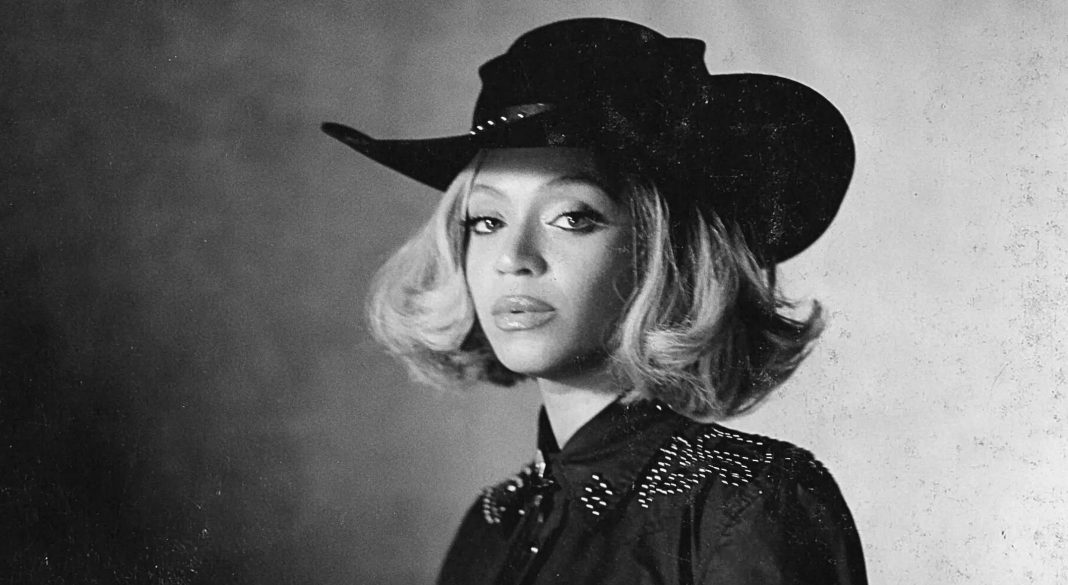The Grammys outfit should have been our first clue. Sitting under a wide brim, designed by Pharrell Williams for Louis Vuitton, Beyoncé Knowles donned a button up and a leather bolo-tie outfit which, although beautiful, seemed instantly discordant with her usual red-carpet attire. Fast forward a week, and those who stayed up for the Superbowl were treated to a rather spectacular ‘Can’t B Broken’ advert with telephone provider Verizon, which culminated in Beyonce’s uttering the fateful words “OK, they ready — drop the new music”.
Our reward? A trailer visual and two singles: ‘Texas Hold ‘Em’, and ‘16 Carriages’, all grounded in a rootin’ tootin’ style of Country that feels warm, wholesome and perhaps most importantly, demonstrative of her iconic vocal. Just like that, a new Beyoncé era was upon us. Yee, and indeed, haw.
If you look around the current pop climate, Yoncé isn’t the only one donning her spurs. Earlier this month, Lana Del Rey announced her own forthcoming Country album, ‘Lasso’, whilst Kacey Musgraves very recently dropped details of her album ‘Deeper Well’, which, from the strength of its lead single, should maintain her role as leader of Country’s relatably-millennial guard. Maggie Rogers, meanwhile, also seems to be taking rootsy influence on her new song ‘Don’t Forget Me’, a campfire-confessional that she describes as a “rough journal entry” of getting older and freeing herself from comparisons to other’s peoples love.
So what exactly has got so many artists deep in their cowboy-rhinestoned bag for 2024? Whilst the Country aesthetic has been lurking in high-end pop and internet culture for some time — Lady Gaga’s ‘Joanne’, the enduring retro-affection for Shania Twain, Dolly Parton and Madonna’s ‘Music’ era, the omnipresence of Coachella’s desert fashion, even the Walmart yodelling kid —Google Trends data suggest that worldwide searches for Country music have actually been on a gentle decline since the 00s (while still being considerably more sizeable than searches for Rap or Rock.)
The last big notable search flurry? September 2019, roughly around the time that Lil Nas X completed his 19th consecutive week atop the Billboard Hot 100 with the Billy Ray Cyrus remix of ‘Old Town Road’. Reigniting global conversation around Country (and ruffling a fair few conservative feathers), ‘Old Town Road’ arguably threw open the tavern doors for a fresh understanding of what Country could be, or indeed, how it could be reclaimed by artists who wanted to blend America’s favourite style of music with other fresh and subversive genre cues.
Since then, we’ve seen the re-popularisation of Taylor Swift’s Country back catalogue via the (Taylor’s Version) re-recordings, the breakthrough successes of Orville Peck, CMAT and Kara Jackson, the album imagery of Solange’s ‘When I Get Home’ and Self Esteem’s ‘Prioritise Pleasure‘, and even Paramore donning their tassels to play a homecoming Nashville show at the Grand Ole Opry. In 2022, history was made when Country occupied the top three slots on the Billboard charts for the very first time, whilst even more recently, Noah Kahan has been praised for finding new ways to spark conversations about vulnerability and mental health, bridging gaps between often-gendered divides.
one year ago today, paramore played their album release show in Nashville, TN at the Grand Ole Opry pic.twitter.com/BwgLs4IwU6
— jen (@YELYAHG00N) February 6, 2024
As with most musical trends or mainstream assimilations, there’s likely a social element to Country’s success as well. The last time this kind of stripped-back, melancholy-yet-earnest songwriting flared up, we were unknowingly on the cusp of two different world crises; the Covid-19 pandemic, and the 2020 BlackLivesMatter uprisings. Both events called attention to Country’s conservative values and encouraged new voices to break through and speak truth to power.
Before boygenius could become an indie household name, The Highwomen were utilising the power of a sisterly collective to call out racism and sexism in the music industry, while Mickey Guyton was making waves as a black Country artist who openly sang about her experiences of exclusion and hopeful reclamation. Now, in a fresh US election year and with Donald Trump trying to re-secure his Presidential place, the world feels both terrifyingly different and depressingly unchanged. With all of that in mind, is it really a surprise that artists might once again be turning to established musical traditions to claim back a sense of community grounding, collaboration and uplifting spirit?
“I used to wake and bake — roll out of bed, hit the gravity bong that I made and start the day — for a while, it got me by — everything I did seemed better when I was high, I don’t know why — so I’m getting rid of the habits that I feel are real good are wasting my time.”
— Pop Crave (@PopCrave) February 9, 2024
—… pic.twitter.com/ycROEWAOfX
As any Country star will attest, the genre is built upon the key concept of songwriting as truth telling. When you’re a star of Beyoncé or Lana Del Rey stature, there’s probably something deeply appealing about stripping things back, accessing forms of artistry that sometimes get overlooked in the stan era of expected excess. For Kacey Musgraves, Country has been a lifestyle for some time now. With ‘Deeper Well’, she reflects on healing from both her divorce and her relationship with getting high: “So I’m gettin’ rid of the habits that I feel / Are real good at wastin’ my time / No regrets, baby, I just think that maybe / It’s natural when things lose their shine”. The rhyme pattern is simple, predictable even, but it’s the perfect example of how honest stories can become spellbinding, delivered with the clarity of someone who has had time and space to truly be at peace with themselves. In the spirit of ‘quiet quitting’, ‘coastal cowgirls’, ‘touching grass’ and all the other unplugging phrases that were popularised during the pandemic, it’s a reminder of the romance in slow, rural living, of being present in the small, intimate moments of life as well as the big.
Of course, Country can also support loftier statements. It could be argued that the pivot to Country is actually a way for many of pop’s main girls to be taken more seriously, to have their artistry given the technical props it deserves. In Beyoncé’s case, jokes have been made that she’s simply trying to double her chances of winning genre-based awards by taking on a new musical turf. More believable is that ‘Act II’ is her way of continuing her efforts to highlight black contributions to music genres where they might have previously been underappreciated or overlooked. Whilst ‘Act II’ is far from her first Country rodeo (see ‘Lemonade’ track, ‘Daddy Lessons’, or that now-legendary AMAs performance with The Chicks), her desire to explore it in album form is likely much more about celebrating her Texas background and Black cultural legacy than it is her desire to game any musical charts, doing for Country what ‘RENAISSANCE‘ did for dance and house.
That said, there must still be room for sobering moments of critique amongst this glittering line dance of Country’s new awakening. As many on social media have pointed out this week, there is a huge irony to the way that the big announcements at the Superbowl or the Grammys or any other spectacle American entertainment event may distract us from the very real atrocities going on around the world, and how musicians’ gestures of social and political engagement are not always as revelatory as they might want us to believe. As NoName put it so perfectly with her song ‘namesake’, big artists are often complicit in celebrating their idealised vision of freedom and the all-American dream to such an extent that they serve to support the very conservative and capitalistic values that their music claims to be against.
The politics around Country music are rarely simple, even when the lyrical patterns and sonic gestures feel familiarly so. But if there are clear examples in recent history of how women and POC artists have been able to reclaim Country songwriting as a way of fighting for progressive values, there is hope that this current mainstream groundswell will serve up fresh consciousness, or at very least, inspire new artists to know that they can embrace the genre in their own way. Country is clearly in rude health on its own, but if some of pop’s most eminent female songwriters are getting in on the action, we can’t wait to see what comes riding down the road, flowing manes and rhinestones and all.







